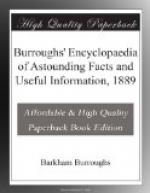THE BLUE LAWS ON SMOKING.—There were some very stringent laws in Massachusetts against the use of tobacco in public, and while the penalties were not so heavy, yet they were apparently rigidly enforced for a time. We quote from a law passed in October, 1632, as follows: “It is ordered that noe person shall take any tobacco publiquely, under paine of punishment; also that every one shall pay 1_d._ for every time hee is convicted of takeing tobacco in any place, and that any Assistant shall have power to receave evidence and give order for levyeing of it, as also to give order for the levyeing of the officer’s charge. This order to begin the 10th of November next.” In September, 1634, we discover another law on the same article: “Victualers, or keepers of an Ordinary, shall not suffer any tobacco to be taken in their howses, under the penalty of 5_s._ for every offence, to be payde by the victuler, and 12_d._ by the party that takes it. Further, it is ordered, that noe person shall take tobacco publiquely, under the penalty of 2_s._ 6_d._, nor privately, in his owne house, or in the howse of another, before strangers, and that two or more shall not take it togeather, anywhere, under the aforesaid penalty for every offence.” In November, 1637, the record runs: “All former laws against tobacco are repealed, and tobacco is sett at liberty;” but in September, 1638, “the [General] Court, finding that since the repealing of the former laws against tobacco, the same is more abused then before, it hath therefore ordered, that no man shall take any tobacco in the fields,




